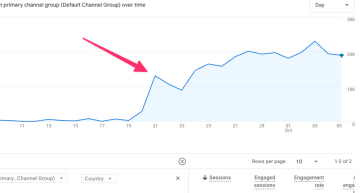Will new gTLD SEO change search landscape?
It’s been known for quite a bit of time the importance of a domain name and its ability to provide businesses with search ranking advantages.
If business owners would have known the outcome of the Internet and the .com craze of the mid 90’s some twenty years ago, then I’m almost certain that most would give thousands of dollars to go back in time to have purchase their premium .com of choice when they were free or cost a few hundred dollars.
There were millions and millions of domains floating around with little to no financial investment.
You simply had to be a risk taker, gambler, or saw just a glimpse of what the Internet could and would become.
It’s always difficult to predict and know the future from where we stand today.
However, it is much easier to take a 20/20 glance back down memory lane and see all the signs pointing to your current position.
Fast forward from decades ago, and it looks like history might be repeating itself again with the second coming of new gTLDs or new domain extensions.
By time its all said and done, there will be nearly 1,900 new domain extensions in the open market.
Currently, based on new gTLD stats, new gTLDs are off to a slow start although extensions below are gaining momentum as the public become aware of the new gTLDs.
- .guru
- .berlin
- .photography
- .today
- .link
As more registries and registrars like GoDaddy, Uniregistry, Donuts, 1And1 and others began offering more new gTLDs to the public in mass, there is a good chance we will start to experience a change in the SEO landscape.
The current SEO landscape consists of .com domains owning a good bit of search. But don’t be fooled that .com will always control search rankings.
Those whom are very fortunate to have purchased premium .com domains or exact match domains and developed websites that command page one rankings in search engines might very well find the premium and exact match domain gTLDs giving them a run for their money.
I’m not saying new gTLDs will own search as a 100% guarantee, but I’m sure new gTLDs will shake up and disrupt SEO and search rankings.
I have a friend who recently won a contract to develop a company brand and website for a new client.
The client expressed an interest to use keywords as their domain name and not their business name. My friend informed the client that the .com, .net, and .org were taken although the .info and .co were taken.
I was for sure my friend was going to suggest the .info and .co, as my experience talking with small business owners about new gTLDs has been nothing but confusion.
But to my surprise, my friend suggested .guru and I was even more surprised at what he told me next. I was floored to hear how excited and thrilled the client was to know that they could purchase a .guru domain using their exact match keywords of “pain free performance”.
This left me scratching my head because I don’t know too many people that have started developing websites using new gTLDs and ranking well in search engines.
When you type in the keywords “pain free performance” into Google, you’ll find that the .com is in a commanding position number one.
You may also notice that there is a .co.uk variation listed. Now the .guru website has only been up for about two weeks and already ranking on page two of Google for “pain free performance”.
And granted, the keywords don’t appear to be highly searched, basing this assumption on not seeing any ads for the keywords when search in Google.
However, I assume the ranking of this .guru website will only increase because of the following:
- ageing of both the website and domain
- fresh content being created on an ongoing basis
- a greater link building presence being created as others link to the website
Who knows when the website will reach page one and if it will overtake the position of the exact match .com domain, if ever.
Although this may be unique instance of one website out of hundreds of millions throughout the world, I think it may point to a big shake up in the SEO landscape within the next 12 months, if not earlier.
We’re probably bound to see a Shortcutts video from Matt Cutts in the near future about new gTLD SEO.
I would imagine search algorithms at a minimum will change and adjust to add account for the keyword to the right of the dot as well as accounting for the keyword or keywords to the left of the dot as it does today.















